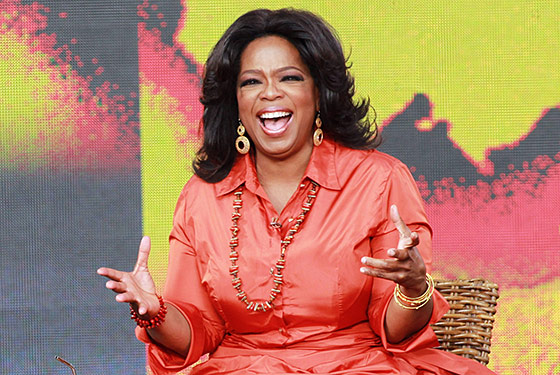
Are there still people who straight-facedly reply, ÔÇ£Working too hardÔÇØ when asked in a job interview what their biggest failing is? That kind of na├»vet├® and over-reliance on bromides would get them laughed out of any conference room, but it would make them perfect viewers for Oprah WinfreyÔÇÖs new OWN network, a conflict-free zone where positive thinking rules the day and triumphs over adversity happen every half-hour (though with the adversity preferably kept off-camera). The channel is a bold new gamble not simply because of the size of its scope and the big name backing it, but because of the unusual question it asks: Can television still be involving without any conflict?
Many fledgling networks begin with a slate that leans heavily on inexpensive reality shows, and though OWN follows that template, itÔÇÖs only got one reality competition: Your OWN Show: OprahÔÇÖs Search for the Next TV Star, a series thatÔÇÖs wholly devoid of backstabbing testimonials or game-show villains. (No one on Your OWN Show will ever utter the reality staple, ÔÇ£IÔÇÖm not here to make friendsÔÇØ ÔÇö in fact, anyone willing to state the exact opposite would almost certainly see that sentiment aired.) The rest of the schedule is dedicated to inspirational, near-hagiographic programming, and while itÔÇÖs respectable in its intent ÔÇö reclaiming reality from the staged catfights and muck-wallowing itÔÇÖs come to represent ÔÇö the execution leaves something to be desired.
The best example is the networkÔÇÖs current centerpiece show, Season 25: Oprah Behind the Scenes, a workplace documentary that chronicles the last season of The Oprah Winfrey Show. It canÔÇÖt be easy to execute what Winfrey and her executive producers manage every weekday, especially in their pull-out-all-the-stops final year, but once the fun little details of Behind the Scenes (like the look inside WinfreyÔÇÖs gilded office) lose their novelty, thereÔÇÖs not much content there. Producers fret mildly over whether theyÔÇÖll pull off some of their biggest on-air challenges, and then things magically resolve themselves (most likely, as lower-level staffers execute those challenges offscreen). With its opulent interiors and its steadfast refusal to introduce real conflict, the show might as well be a female version of Entourage.
And thatÔÇÖs a shame, because underneath the surface, there are provocative issues at play. Elsewhere on the network, Winfrey touts an upcoming show called Kidnapped by the Kids, where workaholics must surrender their BlackBerries and go on road trips with their children ÔÇö so how do the staffers of Behind the Scenes reconcile their own parenthood with what Winfrey admits is a demanding job with late hours? The second episode proves that Winfrey is willing let less-flattering moments slip through (she gets satisfyingly snippy when one producer hedges on his ability to deliver an hour-long segment), but by and large, the conflict inherent in creativity is nowhere to be found, and instead we get nearly wordless filler where Winfrey makes breakfast for a few minutes. What should be the thrilling specificity of watching smart people at work ÔÇö the sort of thing that powers us through an episode of Project Runway or Top Chef, even if we have no idea what the contestants are discussing ÔÇö is watered down for maximum accessibility.
The channelÔÇÖs interview series, Master Class, feels particularly constrained by this raison dÔÇÖ├¬tre. Newsmakers like Diane Sawyer, Jay-Z, and Condoleezza Rice sit in front of the camera and tell flattering stories (to a never-heard interviewer) with even more flattering edits and lighting, but in the age of Twitter, do celebrities really lack the opportunity to self-mythologize? ItÔÇÖs all intended to be inspirational, but these fascinating lives have been sanded down in the process, and the irony is that Winfrey herself has gotten some of her best material from far pricklier interviews ÔÇö though friendly and conspiratorial with guests like Whitney Houston, Winfrey is fascinating when plopped opposite someone she can barely stand, like James Frey or Mackenzie Phillips, and the discussion finally must move past clich├®s and into real talk.
There is hope on the horizon ÔÇö an upcoming reality series about women in prison eschews Teen Mom sensationalism yet still feels bracingly specific (and may prove a welcome antidote to the channelÔÇÖs warm-and-fuzzies) ÔÇö and it seems like critics and viewers are willing to give the channel a chance to figure itself out. Still, while itÔÇÖs admirable that Winfrey has tried to use her clout and her channel to help people be their ÔÇ£best selves,ÔÇØ if the actual content remains as vague as that declaration, OWN wonÔÇÖt be any better than an inspirational office poster.

